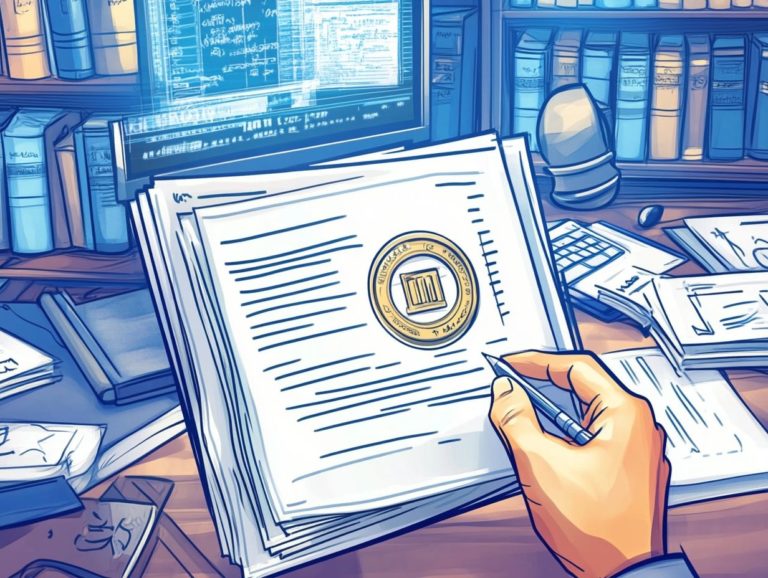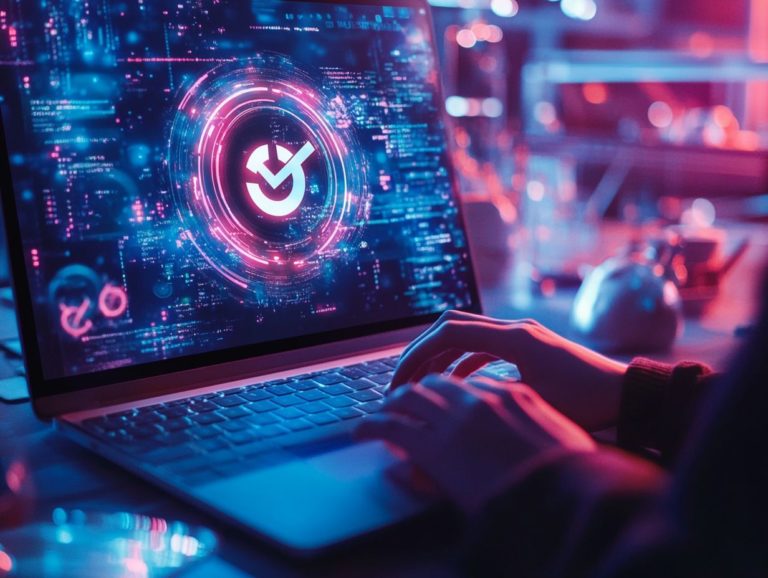The Impact of Digital Piracy on Copyright Law
Digital piracy has become a complex challenge that intertwines technology, law, and ethics. As the internet reshapes how we consume and share content, copyright law must adapt to protect creators while considering consumer access.
This text explores the history and evolution of copyright law in response to digital piracy, examining its financial impact on copyright holders and consumer access to content. It also discusses current laws, enforcement efforts, and what the future may hold in this ongoing struggle.
Engage with us as we unpack these essential themes and their broader implications.
Contents
- Key Takeaways:
- History of Digital Piracy and Copyright Law
- The Impact of Digital Piracy on Copyright Holders
- The Impact of Digital Piracy on Consumers
- Current Laws and Enforcement of Copyright Infringement
- Efforts to Combat Digital Piracy
- Future of Digital Piracy and Copyright Law
- Frequently Asked Questions
- What is digital piracy and how does it impact copyright law?
- How has the rise of digital piracy affected the entertainment industry?
- What are the legal consequences of digital piracy?
- Is it illegal to download copyrighted material for personal use?
- How do copyright laws protect against digital piracy?
- What can individuals and organizations do to prevent digital piracy?
Key Takeaways:
- The evolution of copyright law is shaped by the rise of digital piracy, leading to new challenges and solutions for protecting creative works.
- Digital piracy significantly affects copyright holders, causing financial losses and raising concerns about safeguarding their creations.
- Consumers enjoy easy access to pirated content but must consider the ethical implications and potential consequences of supporting copyright infringement.
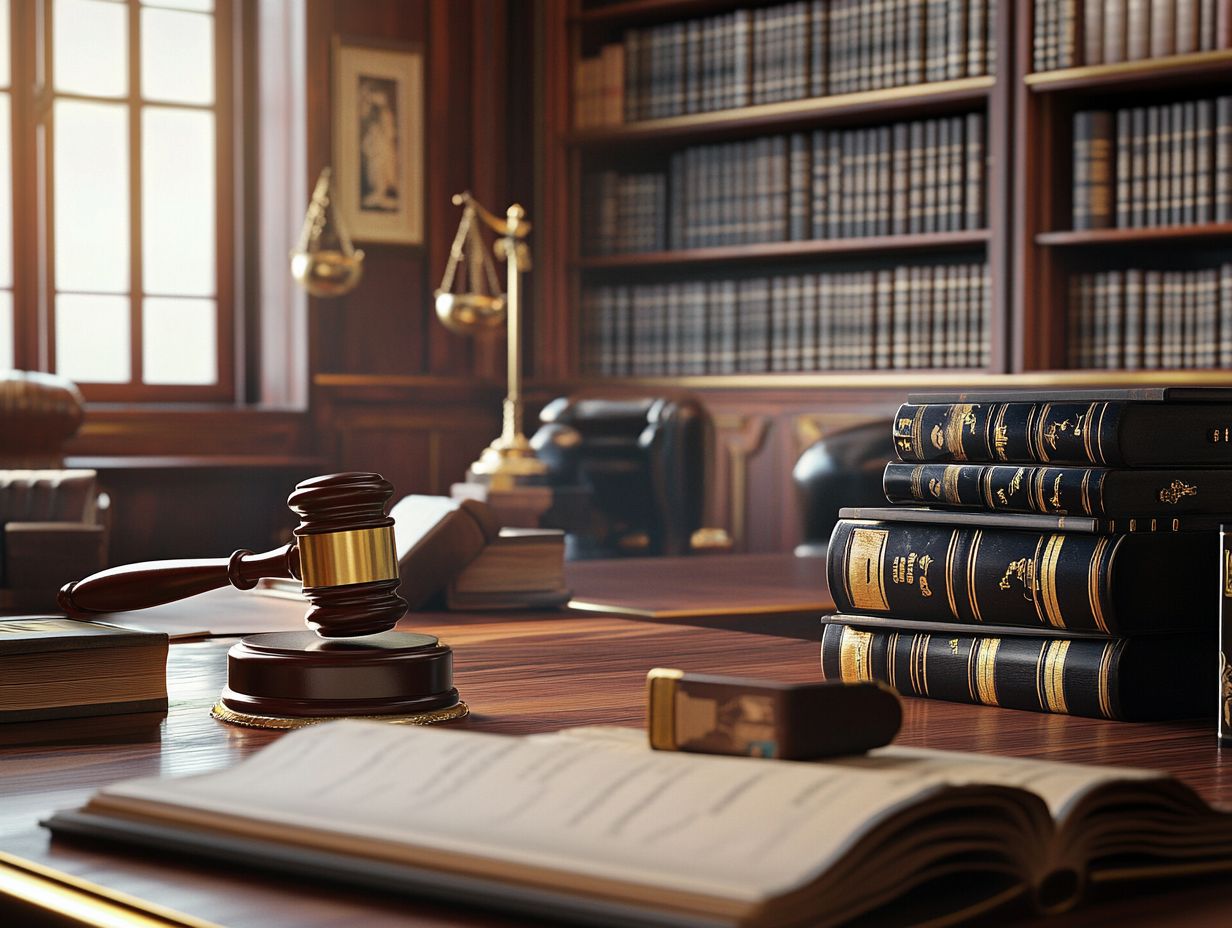
Defining Digital Piracy and Copyright Law
Digital piracy involves the unauthorized distribution and use of creative works, like music and books, in the digital space, creating significant challenges for copyright law. As technology evolves, the line between legal distribution and piracy often becomes confused. This raises serious concerns for rights holders about protecting their intellectual property and creative integrity.
This environment shows that we need strong copyright laws to protect creators’ rights against infringement. When works are pirated or shared without permission, it affects the original creators’ potential revenue and reduces their motivation to innovate and produce new content.
The consequences extend beyond individual artists, impacting entire industries that rely on the protection of their creative works. In today’s digital era, the rapid spread of information complicates enforcement, as tracking unauthorized use and holding violators accountable remains challenging.
This underscores the urgent need for a balanced approach that supports creativity while upholding creators’ rights.
History of Digital Piracy and Copyright Law
The history of digital piracy and copyright law unfolds as a rich narrative filled with pivotal events and technological breakthroughs that have greatly influenced intellectual property rights.
When platforms like Napster emerged in the late 1990s, they posed unique challenges to the music industry. This led to responses from legislative bodies like Congress and organizations such as the RIAA and MPAA. These entities acted quickly to strengthen copyright protections outlined in the U.S. Constitution while navigating the delicate balance between innovation and protection.
Evolution of Copyright Law in Response to Digital Piracy
The evolution of copyright law in response to digital piracy has been shaped by legislative efforts aimed at addressing the economic motivations of both creators and infringers, along with the urgent need for effective enforcement.
As digital platforms multiply, the challenges of enforcing copyright protections have transformed. This prompts the need for adaptive strategies that safeguard creators’ rights while considering public interest.
Over the years, key legislative measures like the Digital Millennium Copyright Act (DMCA) have been established to address online violations. This law allows for takedown notices and sets safe harbor provisions for internet service providers, creating a more organized approach to managing unauthorized distribution.
However, these developments have sparked debates over fair use and accessibility. Enforcement actions against major piracy platforms, such as The Pirate Bay, highlight the ongoing tension between protecting creative works and ensuring public access.
As copyright law continues to evolve, the big question is how we can foster a creative economy that supports innovation while preventing infringement.
The Impact of Digital Piracy on Copyright Holders
The impact of digital piracy on copyright holders is profound. It results in considerable economic losses in music sales and movie revenues due to widespread copyright infringement, highlighting the need to understand the impact of digital technology on international IP law.
This phenomenon disrupts stable income in the creative industries, posing risks to the overall creative ecosystem. It directly affects artists and rights holders, limiting their ability to invest in their craft and stifling innovation.
Loss of Revenue and Protection of Intellectual Property
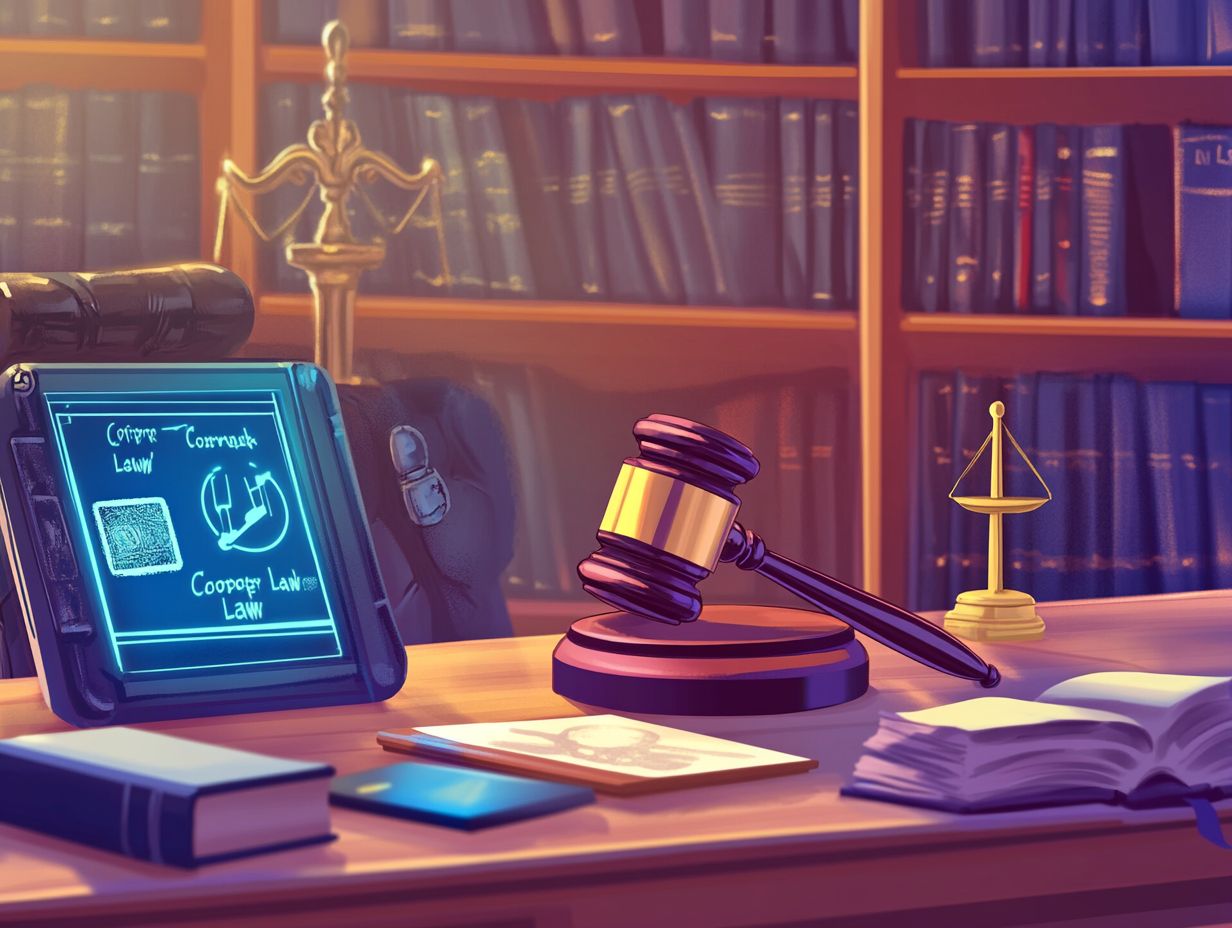
The loss of revenue from digital piracy undermines the rights creators have over their work, leaving you and other rights holders vulnerable to infringement. This financial blow affects not just artists, but also the broader creative industries, threatening artistic integrity.
Statistics reveal that the global entertainment industry loses billions each year due to unlawful downloads and streaming. A study by the U.S. Chamber of Commerce estimates piracy costs the economy around $29.2 billion annually.
This loss reduces funds available for creators to produce high-quality content and leads to fewer job opportunities across sectors, from production to distribution.
When the value of creative works is diminished, it sends a troubling message about the worth of intellectual property. This discourages investment and innovation in the creative economy. The interconnected nature of these financial repercussions highlights the urgent need for robust copyright protections to restore balance in the industry.
The Impact of Digital Piracy on Consumers
Digital piracy influences your experience as a consumer, reshaping how you access content and raising important ethical questions about consuming creative works.
While unauthorized distribution may grant you instant access to music and movies, it also erodes the rights of creators. This behavior hinders the growth of legitimate alternatives, affecting content availability.
Access to Content and Ethical Considerations
Accessing content in the digital age is a double-edged sword. Ethical considerations around digital rights often clash with your choices as a consumer.
While you may prefer platforms like Netflix and Spotify for legitimate access, the temptation of free, pirated content raises ethical dilemmas about supporting artists and the creative economy.
Your choices significantly impact the sustainability of creative industries. When you choose illegal downloads or streaming, you inadvertently undermine the financial viability of those who create the content you enjoy.
The ease of obtaining free content can overshadow fairness and legality, leading to a sense of ethical complacency.
To promote ethical consumption, it s vital to raise awareness about the consequences of your choices. Supporting legitimate services rewards companies that prioritize fair treatment of creators.
Educational campaigns, along with improved affordable access, can guide you toward responsible choices that honor the hard work of artists and positively contribute to the cultural landscape.
Current Laws and Enforcement of Copyright Infringement
Current laws surrounding copyright infringement have evolved significantly. Legislative initiatives and international collaborations aim to enhance enforcement against piracy.
As digital platforms advance, the need for adaptive legal frameworks grows critical. Ensuring that the rights of copyright holders are upheld and their creative works are effectively protected is essential.
Overview of International and Domestic Laws
An overview of international and domestic laws reveals a complex tapestry of approaches to copyright infringement, reflecting the challenges posed by the digital age. Countries from France to India have crafted distinct legal frameworks and enforcement strategies to tackle piracy, each influenced by their unique cultural and economic contexts.
For example, the United States boasts a robust system of copyright protection, complete with significant penalties for infringement. In contrast, other nations may prioritize public access to information over stringent enforcement.
In Europe, the focus often lies in striking a balance between protecting creators’ rights and ensuring that consumers have access to a diverse array of creative content.
India presents a different scenario, grappling with enforcement issues stemming from vast informal markets. This situation has sparked discussions about alternative methods for safeguarding intellectual property that encourage innovation instead of hindering it.
This array of approaches underscores the fact that no single solution has emerged as the definitive answer to piracy. Instead, each jurisdiction wrestles with its own set of challenges and priorities, reflecting the intricate dynamics of copyright in a globalized world.
Efforts to Combat Digital Piracy
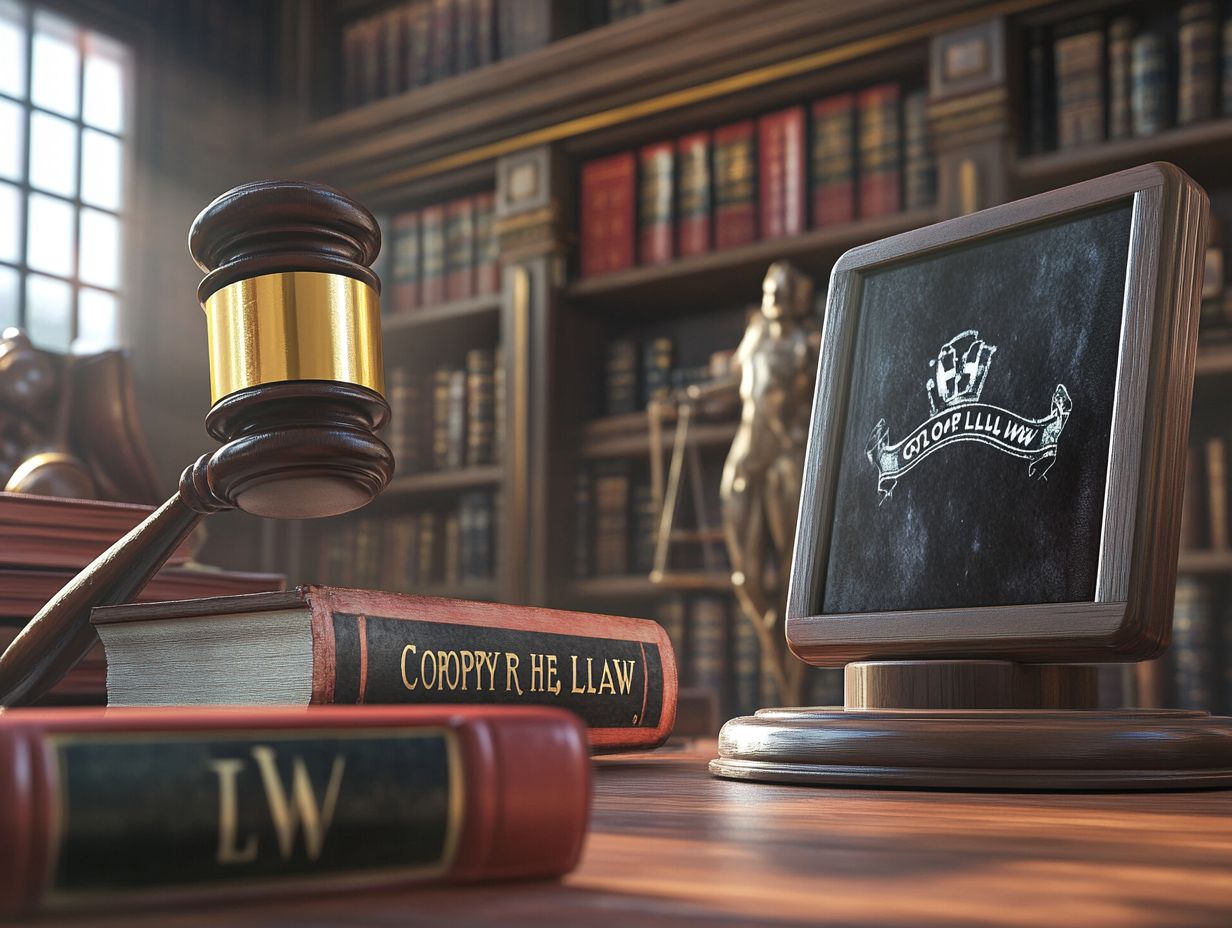
Your efforts to combat digital piracy should encompass a range of strategies, blending technological solutions with legal actions, all driven by a coalition of industry stakeholders dedicated to safeguarding their creative outputs.
By implementing Digital Rights Management (DRM), which helps protect copyrighted content, and pursuing strong legal actions against infringers, you can adopt a multifaceted approach designed to effectively curb the unauthorized distribution of digital content.
Technological Solutions and Legal Actions
Technological solutions like Digital Rights Management (DRM) and legal measures such as lawsuits and enforcement campaigns are at the core of modern strategies aimed at combating digital piracy. As an industry stakeholder whether you’re in the music arena or film production you wield these tools to safeguard your intellectual property and reduce the risks of copyright infringement.
Take, for example, how major streaming platforms increasingly depend on DRM technologies. These systems ensure that their content is accessible only to authorized users, significantly curbing illegal downloads in the process.
On the legal front, consider the high-profile lawsuits targeting websites that facilitate piracy. These actions have led to substantial court rulings and the shutdown of numerous infringing platforms, sending a clear message about the seriousness of copyright violations.
These initiatives aren’t without their challenges. The rapid evolution of technology often gives the power to pirates to circumvent protections, while jurisdictional hurdles complicate the pursuit of offenders across borders.
Navigating the delicate balance between protecting creative rights and respecting user freedoms is indeed a complex dilemma that stakeholders must manage as they adapt to this ever-evolving digital landscape.
Future of Digital Piracy and Copyright Law
Digital piracy is a pressing issue that demands our attention. As technology evolves, both challenges and opportunities for rights holders are emerging.
This scenario presents a blend of challenges and opportunities for rights holders. As digital platforms evolve, it becomes clear that innovative strategies will be essential to adapt copyright protections effectively while nurturing a sustainable creative economy.
Predictions and Potential Solutions
Predictions about the future of digital piracy indicate that innovative solutions will likely emerge. These solutions will tackle persistent challenges faced by copyright law and content distribution in our digital age.
By embracing new technologies and collaborative frameworks, you can help create more secure and equitable access to creative works while safeguarding the rights of copyright holders.
One promising path involves using blockchain technology. Blockchain is a technology that securely tracks ownership and usage rights, making unauthorized distribution a formidable challenge.
Collaborative models can bring together creators, platforms, and users. This can lead to fairer revenue-sharing arrangements, incentivizing content creation and discouraging piracy.
We must adapt our laws to keep pace with technology! This is crucial to combat digital piracy effectively. For instance, streamlined takedown processes, coupled with public awareness campaigns, can enhance legal efforts, fostering a culture of respect for intellectual property within digital communities.
Frequently Asked Questions
What is digital piracy and how does it impact copyright law?
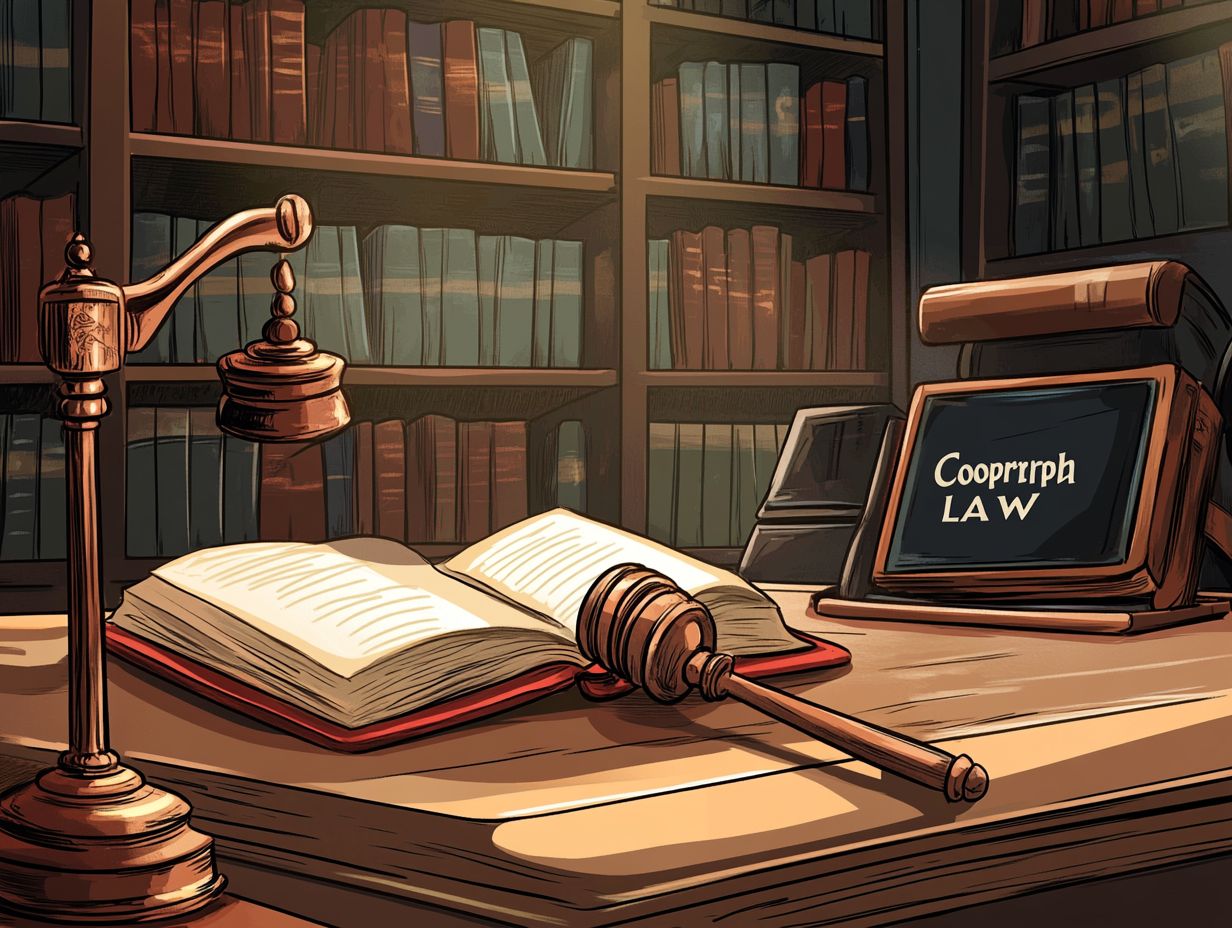
Digital piracy refers to the unauthorized use, distribution, or reproduction of digital content that is protected by copyright law. It impacts copyright law by violating the rights of content creators and potentially causing financial losses to them.
How has the rise of digital piracy affected the entertainment industry?
The rise of digital piracy has significantly affected the entertainment industry. It has led to substantial revenue losses for content creators and distributors.
Additionally, it has caused a decline in the sales of legitimate digital content and disrupted traditional business models.
What are the legal consequences of digital piracy?
The legal consequences of digital piracy can include fines, imprisonment, and civil lawsuits. In some countries, it is considered a criminal offense and can result in severe penalties.
Is it illegal to download copyrighted material for personal use?
Yes, it is illegal to download copyrighted material, even for personal use, without the permission of the copyright holder. This includes downloading movies, music, books, and other forms of digital content.
How do copyright laws protect against digital piracy?
Copyright laws protect against digital piracy by granting exclusive rights to the creators of original content, such as music, movies, and books. These laws also provide legal remedies and penalties for those who infringe on these rights.
What can individuals and organizations do to prevent digital piracy?
Individuals and organizations can prevent digital piracy by educating themselves and others about copyright laws and the consequences of piracy. They can also use digital rights management tools and implement strict security measures to protect their content.
Join the fight against digital piracy! Share this knowledge and help protect creative works.



